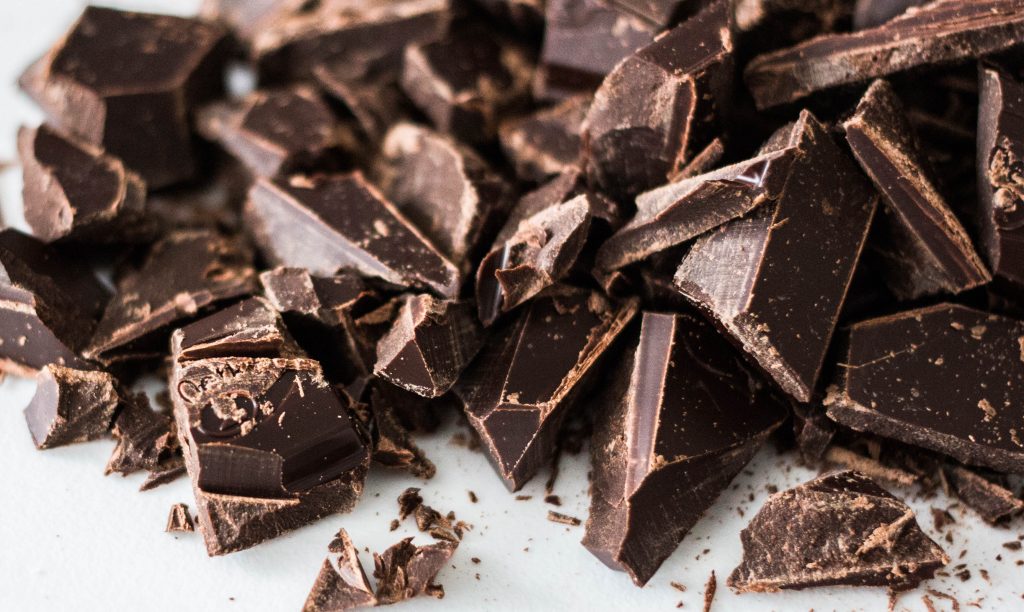We often hear that chocolate is a “superfood”: lifting mood; improving cardiovascular health; providing antioxidants; good source of magnesium and other nutrients; even improving lipid (triglygeride) profiles, (although most of the evidence in the literature is not that compelling).
But what about the downside? There’s a lot of theobromine in chocolate as well as some caffeine. These are the likely active ingredients for many of chocolate’s effects. Theobromine is actually the toxic compound that dogs are very sensitive to (they can’t break it down easily), and chocolate can kill them. It causes increased breathing rate, seizures and eventually death. Theobromine is a compound related to caffeine (they are both methylxanthines) but with longer lasting effects. The main mechanism of action of theobromine, like caffeine, is by binding to and blocking certain adenosine receptors and also by inhibiting specific phosphodiesterase enzymes.
But what about humans? Theobromine seems to be involved in several effects of chocolate. There may be some benefits of theobromine in special circumstances: in the clinic it is used as a blood vessel dilator, a diuretic and a heart stimulant and is under study as a cough suppressant. However the dose may be important too, for example low doses may slow the heart, higher doses speed it up. Mood may be improved at lower doses but there may be negative mood effects at higher doses.
Well, chocolate was top of the list of foods to avoid that was compiled by Dr Buteyko for people with poor breathing patterns and resultant symptoms. Many people with asthma know that it can make asthma worse. Possibly many people can eat chocolate without any problem but some may be more sensitive than others. This may depend on several factors:
- The chocolate – better quality dark chocolate will have much more theobromine than does milk chocolate.
- Age -we tend to become more sensitive to caffeine and possibly theobromine as we age.
- Genetics may play a part too. There’s some genetic variability in the adenosine receptors that the theobromine targets (caffeine fails to keep some people awake because of this difference). And there may be also genetic differences in enzymes that degrade theobromine, resulting in differences in how long the theobromine hangs around in the body and causes symptoms after it has been eaten (With caffeine about 45% are fast metabolisers).
- The person’s current health status, they may be especially sensitive if they have disordered breathing.
Caffeine/theobromine in chocolate can increase heart rate and breathing rate. So chocolate can basically cause hyperventilation or over breathing and if you if you’re sensitive to it, or if perhaps you already have a breathing problem, this hyperventilation can bring on all sorts of symptoms, anxiety being a common one. A lot of people with asthma realise that chocolate can bring on an attack. Over breathing means that you blow off too much carbon dioxide (you become hypocapnic). Breathing out too much carbon dioxide can actually make it hard for your body to utilise the oxygen that you’re breathing in. So even though you are breathing more, you can become deficient in oxygen. For some people it may not be any problem at all to have chocolate. For others it may be problematic. They might not make the association as symptoms might appear some hours later. So just notice if you have chocolate how you feel maybe an hour or two afterwards and see if you’re one of the susceptible ones. Cutting out chocolate could be a very simple solution to some of your anxiety problems.
One last comment, talk about a toxic superfoods double whammy. Dark chocolate is also high in oxalates, again this may not be problematic in the majority of people but can devastate the health of some people. If you have unexplained aches and pains or other health problems and haven’t heard of oxalate, you can start to find out here.
So sorry to rain on your parade and make you question heavenly, unctuous chocolate, but twice recently I have eaten a few squares of expensive, good quality, dark, 85% chocolate and suffered hours later with out- of- control big volume breathing, anxiety, headache and a bad night’s sleep, and none of my usual breathing tricks helped much. At least I knew that it was chocolate associated hyperventilation and that it would wear off. Can you make a connection? It is best that you know so you can limit your chocolate, I hope I can!
Further reading:

Leave a Reply